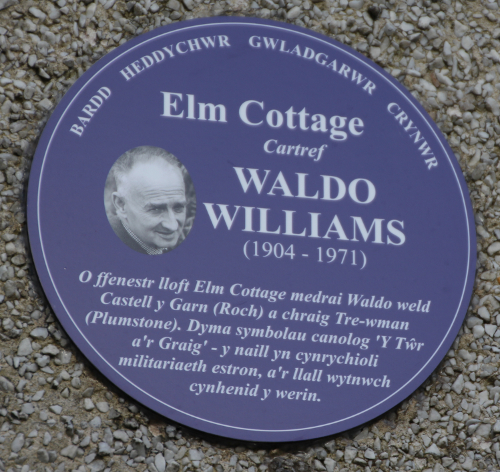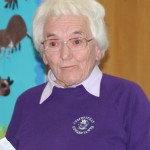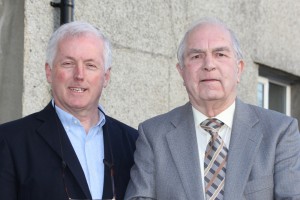
Waldo Williams was a person who could be easily loved, according to Dilys Parry, on account of the fact that he was such ‘a dear, dear man’. She came to know him well through attending his night classes at Haverfordwest, assisting him in his 1959 general election campaign, and joining him and his fellow Quakers on their frequent walks.
On the occasion of unveiling a plaque on the wall of Elm Cottage, Llandysilio on May 21 – the day following the date of his death – it was strange to witness the exuberance which took hold of all who shared their memories of Waldo. Even the slightest detail seemed to be elevated just because they were associated with the renowned poet and pacifist.

David Williams, on behalf of the nephews and nieces, said they were, as a family, of the opinion this was the most important plaque to be unveiled by Cymdeithas Waldo to date. This was Waldo’s home as well as the home of his sisters, his brother and his parents, after they moved from Mynachlog-ddu, when he was almost ten years of age, exactly a hundred years ago.
The Rev Wynn Vittle, with much reverence, referred to the significance of the concept of ‘home’ in this context as he unveiled the plaque. It was an exemplary home because it was a kindergarten of notions and ideas for the young Waldo as he listened to his parents, John Edwal and Angharad, and his Uncle Gwilamus, and partook in their discussions. It was here, also, that he and his two great pals, Wil Glynsaithmaen (W. R. Evans) and Ernie Lan (Rev E. Llwyd Williams), met to discuss eisteddfodic matters.
From Elm Cottage Waldo saw ‘Swansea aflame’ which led to his poem in praise of his parents, the mainstays of the ‘home’, ‘Y Tangnefeddwyr’ (The Peacemakers). What higher paean of praise could a child give to his parents? From the loft, as well, towards the west, as the plaque testifies, he could see Roch Castle and Plumstone, which symbolised the conflict between militarism and peasantry in his poem, ‘Y Tŵr a’r Graig’ (The Tower and the Rock).

Such a celebration would not be complete without hearing some of Waldo’s poems for children. These were performed by Ysgol Brynconin pupils and a few of his poems were sung by the evergreen sisters, Beti and Siân, as everybody congregated at the school hall to listen to the reminiscences.
Ithel Parry-Roberts was a teenager when Waldo arrived at Mynachlog-ddu one evening on his bike, ‘wearing shorts and with hairy legs’, and spoke to the young lads who had gathered on the square as was their habit. He quizzed them on the characteristics of the area before disappearing and then returned wearing a long trousers continuing with his cross-examination in an almost unintelligible manner. He disappeared again. This time to deliver a lecture. Ithel’s father, the Rev R. Parry-Roberts, pronounced on the hearth that evening, following the lecture, ‘Waldo was in his own world tonight’.
Ithel had the privilege of escorting Waldo to some of the election meetings in north Pembrokeshire. He remembered the meeting at Boncath when someone in the audience warned Waldo, ‘you’ve got to be a good English speaker up in London’. The Mynachlog-ddu headmaster, E. T. Lewis, responded on Waldo’s behalf by informing the heckler that would be the least of the candidate’s problems as he had a degree in English and that he could teach the inquisitor a few things on how to express oneself in English.
Twice crowned bard, Eirwyn George, remembered Waldo’s contribution to the radio programme ‘Ymryson y Beirdd’ when teams of poets would compete against each other to complete tasks set by the presenter. He hardly missed an opportunity to represent Pembrokeshire, apart from his time in jail, in order ‘to help out’ as he would say. Other bards of similar ability would not take part in the live broadcast competition. Apparently Waldo failed to complete his task on one occasion. That is part of the myth which surrounds him.
Eirwyn well remembered the hullabaloo at the 1968 Barry National Eiisteddfod when Waldo was one of the three adjudicators of the Crown competition. All three disagreed on the winning entry and a fourth adjudicator had to be brought in to clinch the decision. Alun Llywelyn Williams decided in favour of Waldo’s choice and an extremely abstruse poem by the Rev L. Haydn Lewis, Ton Pentre, was deemed worthy of the crown. It was usual in those days for the adjudicators to deliver their individual adjudications in the Literary Pavilion following the ceremony. Though Waldo diligently searched for his notes in his pockets they were not to be found. He spoke masterly for fifteen minutes from memory quoting large chunks of the winning poem. That was the high point of the Eisteddfod according to Harri Gwyn writing in ‘Y Cymro’ – ‘a classic adjudication’. When the winning entries and adjudications were published in ‘Y Cyfansoddiadau’ there were only three short sentences of an adjudication by Waldo on the winning entry.
Wynn Vittle remembered the experience of ‘playing gipsies’ in Waldo’s company when he placed a tablecloth over two chairs to form a tent. They both then took it in turns to go in and out of the ‘tent’. Waldo would regularly visit his sister, Dilys, who lodged next door to the Vittle household in Goodwick. Wynn would be taken by the hand by his ‘playing partner’ to see real gypsies on Rhosloyw Moor, and would give an orange each to brothers, Cecil and Albert Lovell. They would shout, ‘the orange man is coming’ as Waldo and Wynne approached.
He remembered Waldo becoming agitated when a telegram from Llwyd Williams stating ‘the chair is coming’ a few days before the 1954 Ystradgynlais National Eisteddfod. Waldo had to immediately organise for them both to be present in the pavilion to witness his pal winning the Chair. Though they were at the back and could hardly see the stage they were nevertheless there.
Wynn spent time canvassing for Waldo when he stood as Plaid Cymru’s first ever parliamentary candidate in Pembrokeshire in 1959. He well remembered his statement, with typical honesty, soon after the result was announced – ‘it was a mistake to have stood’. He also remembered him being down in the dumps refusing to leave the office on the last Saturday of canvassing. The agent, Eirwyn Charles, was keen to persuade him to wander the streets of Haverfordwest with a loud hailer. But he would not budge.
Eventually he confessed his woe. No, he wasn’t ill. But earlier that morning he had seen George Thomas – later Viscount Tonypandy and Speaker of the House of Commons – in town canvassing on behalf of the Labour candidate, Desmond Donnelly. He had been hurt because at one time both he and George were members of the ILP and avowed pacifists. To Waldo friendship was above politics. He had not been cut out to be a politician.
Dilys Parri couldn’t really fathom why she was such an admirer of Waldo other than to state he had become part of her disposition. She never lost an opportunity no mention his attributes to her pupils at the Prendergast Welsh Unit, so much so that she was asked one day whether Waldo was her ‘boyfriend’. She felt intimately close to him during those long pauses in the middle of a lecture. She never knew where his mind had taken him but she could empathise with those ‘disappearances’. He would steadfastly refuse to recite his own poems. He would walk calmly through a field full of cows when other walkers kept close to the path aware of the danger posed by a herd of animals.
Probably her most poignant memory was when she met Waldo in his best suit on the street in Haverfordwest and thereupon saw a glimpse of his majesty. She asked him where he had been. And his answer was, ‘I’ve been to bury Llwyd’. There was no further conversation. They both loitered quietly in the doorway of T. P. Hughes, the draper shop. One of those moments when we say, ‘please Lord, say a word in the hushed silence’. There was a strong bond of friendship between Waldo and Llwyd.
The unveiling at Elm Cottage and the reminiscences at Ysgol Brynconin were presided over by the Rev Eirian Wyn Lewis, Cymdeithas Waldo chairman. In the staunch countryside tradition, ample opportunity was then given to socialize over a cup of tea and cakes, all organised under the leadership of Anna Williams, Cymdeithas Waldo secretary.
